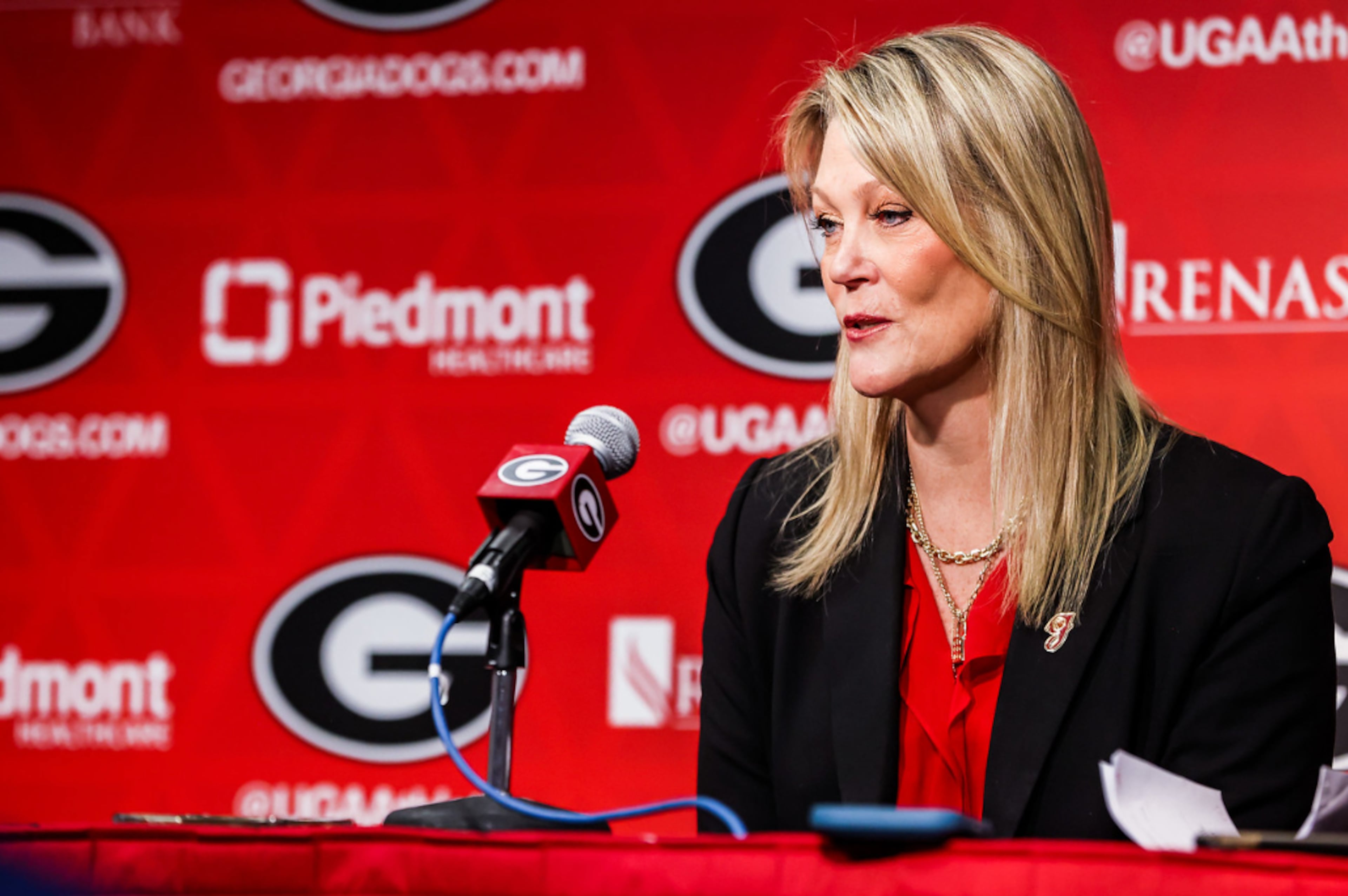Vince Dooley, Georgia football coach with most wins, dies at age 90






































ATHENS -- He was born in Alabama and educated at Auburn University, but he lived and died a Georgia Bulldog.
Vincent Joseph Dooley, all-star football and basketball player, U.S. Marine, national championship football coach, Hall of Fame athletics administrator, published author died Friday afternoon, UGA officials announced. He was 90. Dooley died peacefully at his home in the presence of his wife and their four children.
While the foundation for his life was built in that fair state to our west, it was in Georgia that Dooley spent more than 40 years as master and commander of a juggernaut of an athletics program.
After winning the national championship as the Bulldogs’ head football coach in 1980, Dooley resisted the lure of his alma mater and came back to Georgia to win two more SEC championships, for a total of six.
“He felt like his roots were dug too deep in Georgia,” said Loran Smith, longtime executive secretary of the Georgia Bulldog Club and sideline voice for radio broadcasts. “Had it been earlier in his career, those emotional ties of his alma mater may have won out. But when he looked at all the factors, he felt he had a better situation and better opportunities at Georgia. And as it turned out, he did.”
Dooley was briefly hospitalized Oct. 8 with what was called a mild case of COVID-19. He was released two days later and returned home. He had been receiving hospice care for the past several days.
Dooley had lived in the same house on Milledge Circle since 1963. There he and his wife, Barbara, raised two sons, Daniel and Derek, and two daughters, Deanna and Denise. Only Derek, a Virginia graduate, did not earn a undergraduate degree from UGA, and he came back to earn a Georgia law degree.
Dooley retired as Georgia’s coach and athletic director at the end of the 1988 football season. He considered a second career in politics but, after exploring the possibilities of a run for governor or the U.S. Senate, he thought better of it and asked to return to his athletics director job. Charles Knapp, then UGA’s president, was happy to oblige.
During his tenure as AD, Georgia’s sports programs won 23 national championships and 78 SEC titles.
“I did both jobs for 10 years but, as I have often said, I didn’t realize I had two until I gave up one,” Dooley said upon his retirement in June 2004 at the age of 71.

Smith, who has lived up the street from the Dooleys most of their 50-plus years in Athens, reflected on that dual role.
“Anybody in coaching that wins a national championship has reached the mountaintop, but the continuity of success is what set Vince apart,” Smith said. “He’s one of very few coaches that had great success as both a coach and an administrator.”
Above all, Dooley was a competitor.
From his childhood in the Alabama coastal city of Mobile, when he used basketball and football to avoid a life in the shipyards, to his coaching days when he led Georgia to the national championship, to his controversial retirement as the Bulldogs’ athletic director after a very public power struggle with the university’s president, Dooley competed.
Maryland coach Jim Tatum said as much after facing Dooley, then a young quarterback at Auburn. He called him “the greatest competitor” his Terrapins had ever faced.

That competitive fire was evident every fall Saturday on the Georgia sideline as Dooley twisted, turned, kicked and ran with every step of the Bulldogs’ ball carriers. When Lindsay Scott caught the famous 93-yard touchdown pass from Buck Belue to beat Florida in the waning moments in 1980 in Jacksonville, Dooley ran step-for-step with Scott for nearly 40 yards.
Dooley’s competitive side could be seen in the boardroom as well. When Dooley’s last contract was due to expire in 2004, he asked UGA President Michael Adams first for a four-year extension, then two, then one.
Adams turned Dooley down at each turn and forced him to move out of his fourth-floor office at Butts-Mehre Heritage Hall, the school’s athletics complex. Dooley was granted one additional year as a paid consultant and an office-for-life in the Rankin Smith Academic Achievement Center.
Dooley was bitter, and the controversy created a rift between factions of UGA alumni, athletic association supporters and some state politicians.
“I’ve had 40 great years in one place, " Dooley said in 2004. “I’m not going to let a decision by a person — a decision I don’t agree with — take away from those 40 great years.”
Said Smith: “Vince was the all-time great compromiser. That’s why it stung him so much trying to negotiate his retirement with Michael Adams.”
[STORY CONTINUES AFTER PICS] ...

Dooley was the fourth of five children born to Nellie and William Dooley on Sept. 4, 1932, in Mobile, Ala. He described himself as “a rough-and-tumble child,” prone to finding trouble and never one to back down from a fight. But early in life he channeled his rambunctiousness through sports, along with younger brother Bill.
Vince Dooley actually was considered a better basketball player than a football player. He twice led Mobile’s McGill Catholic High to the state finals and making the all-tournament team each time. But as quarterback at Mobile’s McGill Catholic High School, Dooley led his team to the city championship and captured the attention of Auburn football coach Ralph “Shug” Jordan. Jordan recruited Dooley to play both basketball and football.
A knee injury his junior year cut short Dooley’s basketball career and almost cost him his football career as well. But after undergoing surgery, Dooley made it back for his senior season, and was named team captain and the starting quarterback. Dooley led the Tigers to a 7-2-1 season — and was named MVP of the Gator Bowl. Dooley played in the College All-Star Game in Chicago, then hung up his cleats.
A short time later, Dooley reported for duty with the U.S. Marines at Quantico, Va. He served for two years, most of the time at a recruiting depot at Parris Island, S.C. He received a Second Lieutenant’s commission.
Dooley thought coaching was “an insecure business,” but Jordan talked him into coming back to Auburn as an assistant coach. He started out as a quarterback coach and helped the Tigers secure an undefeated season in 1958.
A short time later, Dooley was appointed head freshman coach, a position he would hold until Georgia came calling.

Dooley, then 31, was named Georgia’s football coach in December 1963 to little fanfare. As the story goes, Athletic Director Joel Eaves had Dooley shuttled into Athens under the cover of night. The young coach was told to lie down in the back seat of a car the next morning as he was ushered from his hotel to the university’s conference center to be introduced as the Bulldogs’ new coach.
“The funny thing about it, nobody would have known who Vince was had they seen him,” said the late Dan Magill, longtime sports information director and Dooley’s driver that day. “He could have walked down College Avenue and nobody would have known who he was. In fact, he was known as ‘Vince Who’ that first year because nobody had ever heard of him.”
It wasn’t long before everybody knew who he was.
Georgia broke a four-year losing streak to Georgia Tech in 1964, Dooley’s first season. In 1965, Georgia knocked off Michigan in Ann Arbor and beat No. 1-ranked Alabama on a flea-flicker play from Kirby Moore to Pat Hodgson to Bob Taylor. In 1966, the Bulldogs claimed their first SEC Championship in seven years.
But the crowning achievement of Dooley’s coaching career came in 1980 when Georgia rode the coattails of a freshman tailback from Wrightsville — Herschel Walker — to an undefeated 12-0 season and undisputed No. 1 ranking. Capped off by a 17-10 victory over Notre Dame in the Sugar Bowl, it was the Bulldogs’ first National Championship since 1942.
With Walker, Georgia won three SEC titles in a row. Walker won the Heisman Trophy in 1982.
Over 25 years, Dooley won 201 games, making him the coach with the most wins in UGA history. He also logged winning records against the Bulldogs’ two biggest rivals, Florida (17-7-1) and Georgia Tech (19-6). However, he was 11-13-1 against Auburn.
“We had a lot of losing games against our main rivals in the Fifties, and he changed all that,” Magill said in 2006. “His teams didn’t make many mistakes, and if you don’t make many mistakes, you can hang in there with anybody.”
Dooley was inducted into the National College Football Hall of Fame in 1994. A statue of Dooley being hoisted on players’ shoulders -- sculpted by Athens artist Stan Mullins -- was erected in 2008 and placed in a garden on the southwestern corner of campus. That area, which houses most of the Bulldogs’ athletic facilities, was named the Vince Dooley Athletic Complex.
In 2019, Georgia’s Board of Regents honored Dooley by naming Georgia’s football field after him. Today, the Bulldogs play on what is officially known as Dooley Field at Sanford Stadium.
Dooley’s reign at Georgia was not devoid of controversy, however. The football program was nearly derailed in the mid-1980s after Jan Kemp, a developmental studies teacher, sued UGA for wrongful termination. She claimed was fired because she spoke out against the athletic association for admitting athletes, football players in particular, incapable of doing college work and used the developmental studies program to maintain their eligibility.
The development studies program was subsequently scrapped, UGA President Fred Davison resigned after the 1986 trial and Georgia took the lead in academic reform for athletes in the Southeastern Conference.
“We made some mistakes but we learned from them and became better as a result,” Dooley said many times.
In 1979, Dooley was succeeded Eaves as athletics director, a position from which he led the Bulldogs to new heights. Over the next 25 years, Georgia teams won 23 national championships and 78 SEC championships.
That such success came during a time when Georgia, like other college athletics programs, was trying to navigate the U.S. government’s new Title IX regulations, made it a particularly impressive accomplishment.
“I don’t think there has been a single athletic director that had the foresight Vince did about women’s athletics,” Smith said. “Look at Georgia and how prominent women’s athletics are today. They are because early on Vince began allocating funds for scholarships and hiring good coaches while some other ADs were trying to figure out how to get around it.”
In 1999, the Bulldogs won four national championships and finished second to Stanford in what today is known as the Learfield College Directors’ Cup standings, an across-the-board measure of athletic excellence.
Dooley led Georgia to national prominence in facilities. He oversaw seven Sanford Stadium expansion projects, raising its capacity to 92,746, to make it the fifth-largest on-campus stadium in the country. Fittingly, the field was officially named Dooley Field by the Board of Regents in 2019.
Also built during Dooley’s tenure were Butts-Mehre Heritage Hall, the Ramsey Center, the Rankin Smith Center, Spec Towns Track, Foley Field and the Jack Turner softball and soccer complex.
Dooley also was instrumental bringing the 1996 Atlanta Olympic Games to Athens. Billy Payne, a former Georgia player and longtime friend, was president of the Atlanta organizing committee and helped arrange for the city to host soccer, rhythmic gymnastics and volleyball.
“I think he was the most complete combination of football coach and athletics director that you could find,” said Claude Felton, who served Dooley as a senior associate AD. “He held both jobs simultaneously and separately. I think people in Athens and the state of Georgia realize the national impact he made over a long period of time. And still does.”





Dooley’s zest for competition and athletics was matched only by his thirst for knowledge. A history buff, he often used vacations to tour Civil War battlefields and was a voracious reader on military subjects. While employed by the university, Dooley would sign up to audit classes every spring. He would attend lectures on history, art, political science and horticulture. It was through that medium that he met Michael Dirr, a UGA horticulturist.
Through his relationship with Dirr, Dooley became an expert gardener. He cultivated his own botanical garden on his property on Milledge Circle. Today, it features more than 1,000 varieties of flowers, trees and shrubs.
“Gardening is a good example of Vince,” Smith said. “Once he got into it, he went into it whole hog. He wasn’t going to be casual gardener; he was going to be a master gardener.”
Dirr even named a breed of hydrangea he created after his friend. Explaining that he felt that Dooley was always strongest when the going got tough, the light-blue colored “Dooley Hydrangea” holds up well in cold weather, “just like Vince,” Dirr said.



